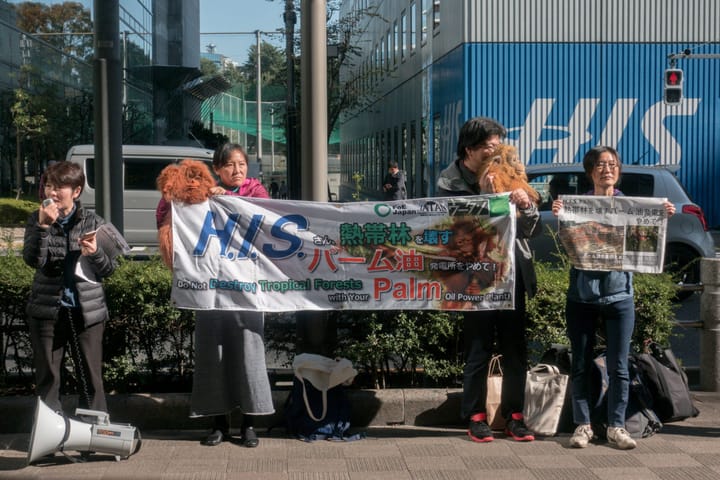Advocates condemn Japan’s harsh immigration laws

In February this year, Wishma Sandamali wrote a letter pleading for help when she thought she lay dying.
The Sri Lankan woman had arrived in Japan as a student in 2017, but was detained as an overstayer at the Nagoya Regional Immigration Services Bureau in late 2020 when she became unable to pay her tuition. “These people don’t take me to the hospital because I am in custody of them,” she wrote to START, an NPO. “I need to recover, but I don’t know how to do it. Please help me to recover.”
Reportedly suffering severe mental distress that prevented her from holding down food, Wishma had begun vomiting repeatedly, eventually losing around 20 kilograms. After suffering loss of control over her limbs, and foaming at the mouth, the 33-year-old was found dead on March 6th.
Her death was made even more senseless when it was learned that a doctor had recommended her temporary release from detention two days prior to her death, saying that treatment could lead to her recovery. Immigration officials ignored the advice. Wishma’s was the 18th confirmed case since 2007 of immigration detainees in Japan dying in custody – including a Nigerian man who died following a hunger strike in Nagasaki in 2019.
Activists have long pointed to the need for deep reforms to the system, which has been repeatedly criticized for its harsh measures. And although the Japanese government is presently aiming to push through a revised immigration law that includes alternatives to detention, human rights activists and supporters say that the proposal is deeply flawed on numerous levels.
Humanity before bureaucracy
The United Nations has noted that Japan’s proposed revisions to its immigration law leaves the fundamental problem of lengthy and indefinite detentions unchanged, while also flouting international laws by subjecting asylum seekers to deportation if their applications have been rejected twice – and jailing those who refuse to leave voluntarily.
A UN Special Rapporteur report dated March 31st, 2021 notes,“We take note that the amendment bill introduces an alternative non-custodial measure. However, we would like to express our concern that detention remains mandatory and the new ‘monitoring measure’ proposed in the bill would only apply as an exception, at the discretion of a supervising immigration control officer.”
“The expulsion of non-nationals in need of international protection, including migrants regardless of their status, asylum seekers, refugees and stateless persons, is prohibited by international law,” the report continued.
According to The Asahi Shimbun, Japan’s liberal flagship daily, 1,054 foreign nationals were held in nationwide immigration detention centers as of the end of 2019, with over 40 percent of those detained for over six months, and in 63 cases, more than three years. The primary reason for detention is overstaying and then refusing deportation orders, which often occurs because the detainees have family members in Japan or fear for their safety if repatriated–and sometimes for both reasons.
In the case of refugees, Japan’s acceptance rate is far below that of its G7 peers, with a total of just 44 recognized in 2019–a mere .04% of total applicants.
Citizens connect the dots, raise their voices
One group speaking out actively against the government’s proposed immigration reform bill and forced deportations has been the youth-led labor organization Posse, which put together an online petition that has gathered more than 45,000 signatures to date, along with supportive commentary from well-known social figures. The group has also attracted support through its social media channels, which includes the Twitter hashtag #humanizenotcriminalize.

Another action that has aimed to increase popular support is a series of sit-in demonstrations held outside the National Diet throughout the month of April, which were timed to coincide with the Committee on Judicial Affairs meetings to discuss the revision. Still ongoing, the protests have drawn some 1,000 attendees to date. The emergency action was organized by the Solidarity Network with Migrants Japan (SMJ), whose Twitter hashtags have included #NoOneIsIllegal in English and #入管法改悪にNO! in Japanese—the latter being a creative wordplay upon “Say no to the immigration law reform” that implies a change for the worse rather than the better.
The protests were also supported by “Open the Gate for All”, a solidarity coalition working against the immigration law revision. Its members include SMJ along with Amnesty International, as well as numerous civic groups working to create an inclusive society that reflects the values of compassion and respect for human life regardless of legal status.
Many attendees at the demonstrations reacted poignantly to Wishma’s recent death, with many referencing her in their speeches, and one overseas supporter saying via Twitter, “I am so sorry we failed you, Wishma san. Rest in Power.”
Elizabeth Aruoriwo Obueza, a Nigerian immigrant rights activist based in Japan, who herself spent time in solitary confinement while in immigration detention, pointed out during the sit-in, “Japan helps refugees overseas, but does the opposite within its own borders. Japan signed the Refugee Convention, and what is necessary is support here for refugees–not discrimination.”
A related demonstration held in front of the National Diet on the evening of April 28 similarly drew a broad swathe of supporters, including lawyers, politicians, nonprofit sector employees, students, activists, and more—all of whom conveyed a sense of collective impassioned energy. Numbering around 250 attendees, the event was organized by the SMJ migrant solidarity network together with the activist youth organization Voice Up, and Free Ushiku, a Twitter-based alliance of concerned citizens that formed after the suicide of a detainee at the detention center in Ushiku, Ibaraki.
Lamenting the conditions that led to Wishima’s death, where numerous detainees continue to languish, Social Democratic Party head and long-time social justice advocate Mizuho Fukushima commented, “Honestly speaking, when the Immigration Services Agency of Japan was created, I thought things would improve—but actually, they’ve gotten worse. These foreigners are not treated as human, and their rights go unprotected.”
Also speaking passionately on the issue was Constitutional Democratic Party of Japan member Kishi Makiko, a member of a lawmaker project team that is working to create a multicultural society, and is presently drafting a Refugee Protection Law.
“At the root of the refugee issue in this country is the disgraceful treatment of foreign workers and migrants–and the government of this country bears a heavy responsibility for its failure to have resolved the problems that they face,” she said pointedly, addressing the committee members whose offices were within hearing range of the demonstration. “There is no way that the revision of the immigration law can be approached without having the deeper discussion about how foreigners are to be treated in our society.”
Nanako Inaba, a Sophia University professor of migrant and refugee issues, recalled the late 1980s-early 1990s as a time when the prevailing social mood was one of inclusiveness, as it seemed likely that the laws would change to permit all foreigners to integrate into society, regardless of legal status. “At the time, the Cold War had just finished and given way to globalization,” she explained. “In my view as a researcher, foreigners in Japan without authorization symbolized a positive future that had transcended borders and nation-states.”
“Although such persons were said to be in violation of the law, I believed at the time that it was society and the legal system that would end up changing–but in fact, exactly the opposite occurred,” she continued. “Actually, what makes no sense is a law that depends upon disregarding human rights and killing people in order to be upheld.”
Problematic definitions
According to human rights lawyer Shoichi Ibuski, one root problem of the present situation is the fact that the definition of “persecution” in Japan is perceived in an exceedingly narrow way compared to other countries. “We (as immigration lawyers) are isolated from both the justice ministry and the immigration bureau,” he said. “We are calling in the strongest possible terms for hearings to be held with those who are likely to face persecution, as well as for professionals who are well-versed in international refugee laws to conduct proper screenings that are in line with international standards.”
Hitotsubashi University professor emeritus Hiroshi Tanaka similarly pointed out that the official name of the Immigration Service Agency of Japan in fact fails to convey the actual name in Japanese, which would accurately be translated as the Immigration Control Agency. “The English version of the name has left out the word ‘control’, which serves to hide what is actually taking place in this country,” he commented during the April 28th protest.
This statement reflected the core essence of the campaign itself: respecting each individual as a worthy human being who is deserving of freedom and respect–not an object to be controlled, or disregarded in their greatest time of need.
“The authority of the Immigration Services Authority is too strong, and the proposed revisions would make it even stronger,” commented SMJ deputy secretary general Makiko Ando. “The danger in entrusting that kind of power to this entity, which has complete control over migrants’ and refugees’ lives, has been made clear by what is actually taking place inside of detention centers—beginning with Wishma’s death.”“We definitely feel that our sit-in protest has been effective in terms of pressuring the lawmakers sitting on the legal committee,” Ando continued. “We are sharing updated information from the National Diet and our emergency action, as well as the latest news about Wishma’s case, through our social media channels–and we will continue holding demonstrations for as long as necessary,” she added. “The voices protesting against the immigration reform are just getting stronger.”


